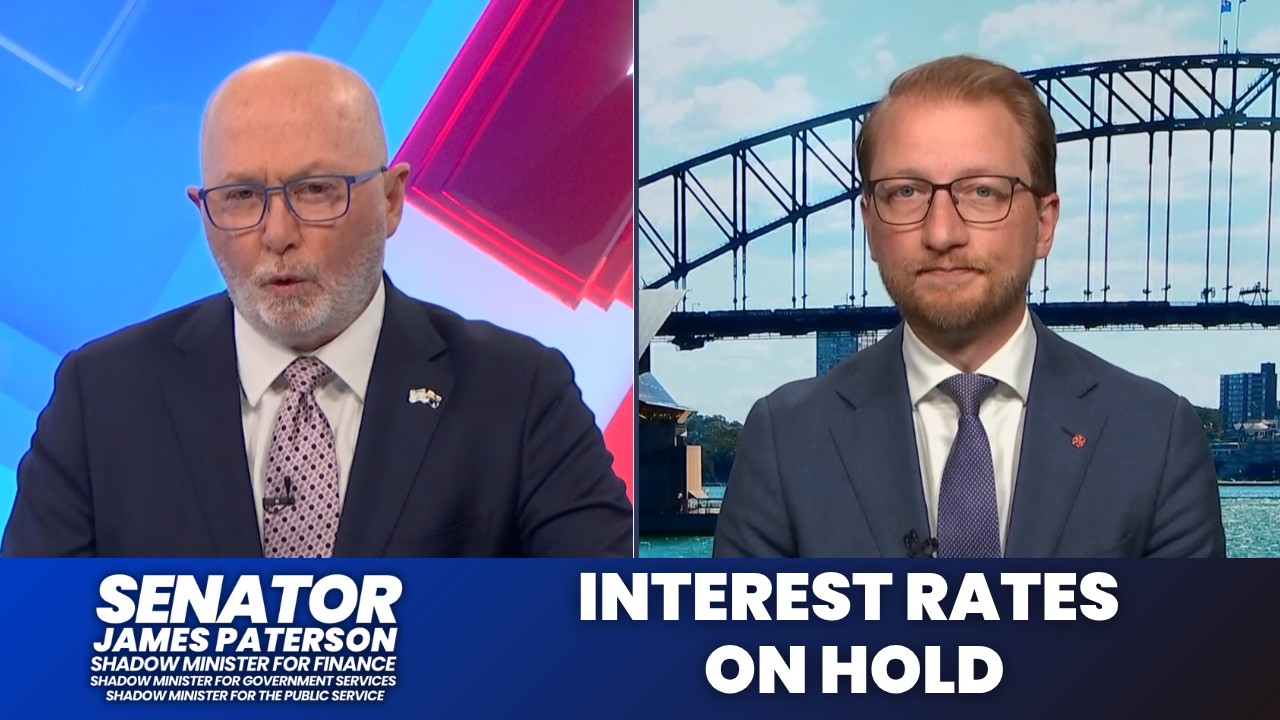Media
|
Transcripts
September 30, 2025

CHRIS KENNY: Let's go now to Shadow Finance Minister James Paterson, who joins us from the Sydney CBD. James, I'll get your thoughts on the Middle East in a moment, but I want to start on your portfolio area, and that is the decision of the Reserve Bank board today to leave interest rates where they are, no further cuts. What does that tell us about where we're heading?
SENATOR JAMES PATERSON: Just as much as the decision to put rates on hold today is the very cautious language from the RBA Governor Michelle Bullock about any further rate cuts that I think will be a devastating blow for a lot of Australian households, particularly those who have big mortgages who are hoping for a number of more interest rate reductions under this government's watch. Because the average mortgage holder is about $20,000 worse off today, even after three rate cuts, than they were before Labor came to office, and they'll be incredibly discouraged by the recent uptick in inflation in the monthly data and terribly worried about the RBA's new posture towards inflation and therefore interest rates. The truth is, Chris, it didn't have to be this way. The government doesn't control everything that happens in our economy, but the one thing they do have total control over is government spending, and the elevated rates of government spending at almost 40 year highs are putting upward pressure on inflation and therefore upward pressure on interest rates.
CHRIS KENNY: Yeah, that's something we've been talking about on this program for many years. Of course, high levels of government spending feed into inflation. Now, the Albanese government knows that. Jim Chalmers must know that. Yet, as you say, the new analysis today shows that spending is at 40 year highs. If you take the pandemic spending out of it, they just continue to increase government spending to these record levels. Now, there are consequences, right, if you're going to have such big spending from government. There are consequences. Do you believe that this inflation genie is not quite back in the bottle yet?
SENATOR JAMES PATERSON: I fear that that's the case. I hope that the quarterly data released in late October is more encouraging than these recent monthly data reports have been, but I am worried because of what you say, Chris. I mean, the only thing you need to know about Jim Chalmers' inability to manage a budget is that he's collecting today, 25-year-high tax hikes, the greatest proportion of the economy in 25 years, and he's still running a budget deficit. The last time a government was collecting this much tax as a percentage of GDP was the Howard-Costello government, when they were running huge budget surpluses to pay down Labor's debt, and when they finished doing that, they gave us some of the largest tax cuts as a proportion of the economy in our history. There's no sight of either on Jim Chalmers' watch. We're not going to get the budget deficits, nor are we going to get the really meaningful tax cuts that would return some of the bracket creep he's stolen from workers over the last three years.
CHRIS KENNY: Yeah, it's a hell of a worry. We'll talk to you in coming months and years, no doubt, about where some of that spending can be trimmed in the years to come, but it's got to be constrained, there is no doubt about that. I do want to get your thoughts, given your background and expertise in foreign affairs and defence issues. On this latest deal proposed by Donald Trump, it certainly is an ultimatum to Hamas, isn't it? But there can be no logical, or rational, or humanitarian reason for Hamas to reject this deal.
SENATOR JAMES PATERSON: Chris, any sane and rational person should want the hostages to be released, Hamas to be dismantled, so that the war can end and, the rebuilding of Gaza can begin, and Israelis can again live in security and peace. And the only way that that happens is if Hamas accepts what is a very reasonable offer from Israel and the United States, which, as you pointed out in your editorial, has some very bitter pills for Israel to swallow, including the release of Hamas terrorists currently in jails in Israel. That will be a very tough thing for the Israeli public to have to accept, but it is a demonstration of their commitment to wanting to end this conflict that they are willing to do that in exchange for the release of the hostages and the dismantling of Hamas. There's no reasonable ground for any reasonable party to refuse this offer. I fear, as you do, though, that Hamas will either refuse to accept it or will accept it in name only and continue to wage their campaign of terror against Israel, and it is incumbent on the entire international community to put pressure on Hamas and their sponsors internationally to accept this reasonable offer.
CHRIS KENNY: We will wait and see, James Paterson. Thanks for joining us.
ENDS